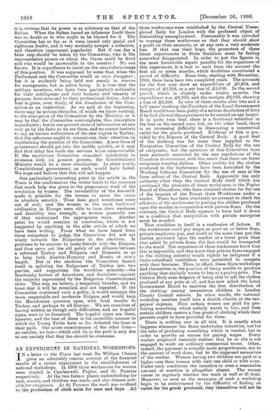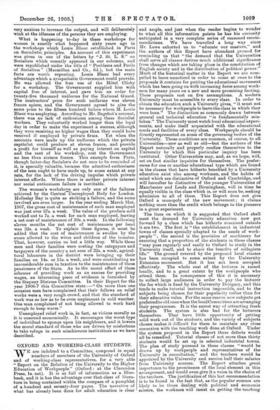AN EXPERIMENT IN NATIONAL WORKSHOPS.
IN a letter to the Times last week Sir William Chance gives an admirably concise account of the financial results of a recent experiment in the establishment of national workshops. In 1906 three workrooms for women were started in Camberwell, Poplar, and St. Pancras respectively. At the two former places underclothing for men, women, and children was made, and also dresses suit- able for emigrants. At St. Pancras the work was confined to, the, production of cloth suits for men and boys. ..A.11 three workrooms were established by the Central Unem- ployed liddy for London with the professed object of diminishing unemployment. Presumably it was intended to manage these workrooms so that they should show a profit on their accounts, or at any rate a very moderate loss. If that was their hope; the promoters of • these latest experiments in State Socialism must be feeling somewhat disappointed. In order to put the figures in the most favourable aspect possible for the organisers of this experiment, it is best to omit from the account the first six or seven months, which 'doubtless constituted a period of difficulty. Since then, starting with November, 1906, there have been two completed years. The'accounts for the first year show an expenditure of £5,854, and receipts of .g2,218, or a net loss of £3,636. In the second period, which is slightly under -twelve months, the expenditure was £6,206, and the receipts £3,038, showing a loss of .23,168. In view of these results after two and a half years' working, the President of the Local Government Board would have been guilty of a serious dereliction of duty if be had allowed the experiment to be carried on any longer. It is quite true that there is a fractional reduction in the loss on the second year, but, on the other hand, there is au increasing difficulty in discovering a commercial outlet for the goods produced. Evidence of this is pro- vided by the Reports of the Central Body. A good deal of the clothing was for some time supplied to the Emigration Committee of the Central Body for the use of emigrants; but the activities of this Committee have been seriously restricted by the new regulations of the Canadian Government, with the result that there are fewer emigrants wanting clothes. Other outlets for the clothes produced in the workrooms have been furnished by the Working Colonies Committee for • the use of men at the fara colony of the .Central Body. Apparently the only authority other than the Central Body itself which has purchased the products of these workrooms is the Poplar Board of Guardians, who have obtained clothes for the use of the inmates of the Forest date Workhouse under a. tender. There has been absolutely no attempt to check the efficiency of the workrooms by putting the clothes produced upon the market in competition with private firms. On the contrary, the Central Body appears to have laid it down as a condition that competition with private enterprise must be avoided.
That condition in itself is a confession of failure. If the workrooms could pay wages as good as, or better than, private employers pay, and could at the same time put the clothes produced upon the market at a lower price than that asked by private firms, the fact would be trumpeted to the world. The organisers of these workrooms know that this is impossible,-and they know that private firms engaged in the clothing industry would rightly be indignant if a State-subsidised institution were permitted. to compete with their business. Thus, in effect, these State workshops find themselves in the position of being unable to produce anything that anybody wants to buy at a paying price. The Central Body even despairs of being able to sell the clothes produced at any price at all, and has now asked the Local Government Board to sanction the free distribution of the clothing among necessitous children in London County Council schools. In other words, the national workshop resolves itself into a double charity at the tax- payers' expense. First certain women are paid for pro- ducing something which nobody wants to buy, and then certain children receive a free grant of clothing which their parents ought to have provided for them.
There is nothing new in all this. It is exactly what happens whenever the State undertakes industries, not for the sake of producing something which is wanted, but in order to provide an excuse for paying wages. Every worker employed instantly realises that he or she is not engaged to work on ordinary commercial terms. Often, indeed, the payment is actually made proportionate, not to the amount of work done, but to the supposed necessities of the worker. Women having two children are paid at a higher rate than women with only one child or with uoue. Under such conditions the incentive to even a reasonable amount of exertion is altogether absent. The money comes in regularly whether the work is well or ill done. Moreover, as soon as the managers of such a workshop begin to be embarrassed by the difficulty of finding an outlet for the goods produced, they themselves will not be very anxious to increase the output, and will deliberately wink at the idleness of the persons they are employing.
What is happening to-day in these workshops for women is exactly what happened sixty years ago in the workshops which Louis Blanc established in Paris on Socialistic. principles. An account of this experiment was given in one of the letters by "J. St. L. S." on Socialism which recently appeared in our columns, and were republished under the title of "Problems and Perils of Socialism" (Macmillan and Co., 6d.), but the main facts are worth repeating. Louis Blanc had every advantage which a sympathetic Government could provide. He was allowed the free use of the Hotel Clichy for a workshop. The Government supplied him with capital free of interest, and gave him an order for twenty-five thousand uniforms for the National Guard. The contractors' price for such uniforms was eleven francs apiece, and the Government agreed to give the same price to the fifteen hundred tailors whom M. Louis Blanc was employing. According to Mr. Bagehot's account, there was no lack of enthusiasm among these Socialist workers. They voluntarily worked longer than the legal day in order to make the experiment a success, although they were receiving no higher wages than they would have received if employed by private firms. Yet when the accounts were made up the uniforms which the private capitalist could produce at eleven francs, and provide a profit for himself as well as paying interest on capital and the rent of his workshop, cost the Government no less than sixteen francs. This example from Paris, though latter-day Socialists do not care to be reminded of it, is specially valuable, because the admitted enthusiasm of the men ought to have made up, to some extent at any rate, for the lack of the driving impulse which private interest affords. Where there is neither private interest nor social enthusiasm failure is inevitable.
The women's workshons are only one of the failures achieved by the Central Unemployed Body for London. Hollesley Bay is quite as striking a failure, and the sums involved are even larger. In the year ending March 31st, 1907, the gross cost of maintenance of each man employed was just over 37s. a week. The value of the produce sold worked out to 7s. a week for each man employed, leaving a net cost of maintenance of 30s. a week. In the following eleven months the net cost of maintenance per head was 32s. a week. To explain these figures, it must be added that the cost of maintenance is swollen by the sums allowed to the wives and children of the inmates. That, however, carries us but a little way. While these men and their families were costing the ratepayers and taxpayers of the country a net sum of 32s. a week, agricul- tural labourers in the district were bringing up their families on 14s. or 15s. a week, and were contributing no inconsiderable sum in taxation to the maintenance of these pensioners of the State. As to the moral effect of these schemes of providing work as an excuse for providing wages, an interesting piece of evidence is furnished by the Stepney Distress Committee. In their Report for the year 1906-7 this Committee state :—" On more than one occasion men have complained that their fellows on relief works were a very rough crowd, and that the standard of work was so low as to be even unpleasant in cold weather. One man complained of not being allowed to work hard enough to keep warm."
Unemployed relief work is, in fact, as vicious morally as it is unsound economically. It encourages the worst type of individual to sponge upon his neighbours, and it lowers the moral standard of those who are driven by misfortune to take refuge in such mischievous institutions as we have described.







































 Previous page
Previous page